Retro Replay Review
Gameplay
Torneko no Daibōken: Fushigi no Dungeon embraces the classic roguelike formula with Dragon Quest charm. You guide Torneko—known to Western players as Taloon—through a series of randomly generated floors, each filled with treasures, traps, and familiar monsters from the Dragon Quest universe. Movement, combat, and item use are all turn-based, meaning every step you take gives foes an opportunity to advance, making careful planning essential.
(HEY YOU!! We hope you enjoy! We try not to run ads. So basically, this is a very expensive hobby running this site. Please consider joining us for updates, forums, and more. Network w/ us to make some cash or friends while retro gaming, and you can win some free retro games for posting. Okay, carry on 👍)
One of the standout features is the risk-versus-reward loop: delve deeper into the dungeon to uncover powerful weapons and rare herbs, but do so at the cost of increasingly dangerous enemies and perma-death of all your carried items. This tension keeps each expedition thrilling, especially when that coveted spell scroll might mean the difference between survival and starting over. The game also allows Torneko to equip any weapons or shields he discovers, adding a layer of customization to suit different playstyles.
Between dungeon runs, you return to Endor to sell your haul and upgrade your shop. This meta-progression system is surprisingly addictive: investing in better display cases, expanding storage vaults, and improving your living quarters directly impacts your next adventure. As Torneko’s shop grows, so does his ability to stash special items for future trips, giving a sense of long-term progression that softens the sting of a failed delve.
Overall, the gameplay strikes a fine balance between accessibility for newcomers and depth for genre veterans. Simple menu-driven commands get you started quickly, while the nuanced item interactions, strategic positioning, and roguelike unpredictability ensure that every run feels fresh and challenging. If you appreciate risk-driven exploration wrapped in an endearing Dragon Quest wrapper, Torneko’s dungeon-crawling antics deliver hours of engaging gameplay.
Graphics
Graphically, Torneko no Daibōken sports charming 16-bit visuals characteristic of the Super Famicom era. The overhead perspective presents neatly animated sprites of Torneko, his assorted gear, and a wide array of monsters—from slimes to more menacing behemoths. Each dungeon floor features unique tile sets that range from moss-covered stone walls to burning magma chambers, maintaining visual variety throughout your adventure.
Despite hardware limitations, the color palette is vibrant without feeling garish. Treasure chests gleam invitingly, while enemy sprites are distinct enough to let you identify threats at a glance. Subtle effects like flickering torches and shimmering items add life to otherwise static rooms. The user interface is clean and intuitive, with menus and status screens that evoke classic Dragon Quest design sensibilities.
Occasional slowdown can occur when multiple spells and monsters overlap on screen, but this rarely hampers overall enjoyment. Animated sequences—such as weapon strikes or spell effects—are punchy and satisfying, giving each combat action a bit of extra flair. In today’s era of high-definition 3D, these graphics carry a nostalgic appeal that many players find endearing.
Story
The narrative premise is straightforward yet charming: after helping heroes vanquish a great evil in Dragon Quest IV, Torneko returns to Endor and opens a humble shop. Though he prospers, his entrepreneurial spirit yearns for a new challenge. Rumors of a “Mysterious Dungeon” reach his ears, and with royal permission he sets out to establish a branch of his store closer to the cavern’s entrance.
What follows is a lighthearted tale of ambition and adventure. Torneko’s motivations revolve around profit and discovery rather than saving the world, which lends the story a refreshingly down-to-earth tone. Occasional NPC interactions—such as bartering with traveling merchants or overhearing courtly rumors—add world-building touches without bogging down the main loop of dungeon exploration.
While there’s no epic villain to confront or grand prophecy to fulfill, the story’s simplicity is its strength. It perfectly underpins the gameplay loop: every descent into darkness is justified by Torneko’s entrepreneurial goals. For players seeking a Dragon Quest spin-off that blends humor, character, and a dash of royal permission, this narrative sets the stage quite nicely.
Overall Experience
Torneko no Daibōken: Fushigi no Dungeon offers a unique blend of roguelike mechanics and Dragon Quest charm. The thrill of entering a new floor, scouring it for treasure, then sprinting for the exit under pressure creates a compelling loop that keeps you coming back for one more run. The shop-building meta-game is a standout feature, rewarding dedication with tangible benefits and a sense of long-term accomplishment.
Newcomers to dungeon crawlers will appreciate the straightforward controls and forgiving early levels, while genre veterans will find enough strategic depth in item management, enemy tactics, and vault storage decisions. Even occasional setbacks—like losing a prized staff to an unexpected monster—feel earned rather than punitive, thanks to the constant opportunity for recovery and improvement.
Visually charming and mechanically solid, Torneko no Daibōken balances accessibility with depth. Fans of Dragon Quest will delight in spotting beloved creatures and familiar spells, while roguelike enthusiasts will relish the procedural surprises. Whether you aim to amass wealth for Torneko’s shop or simply enjoy methodical dungeon-crawling, this title stands as a memorable entry in both the Dragon Quest and roguelike pantheons.
In summary, Fushigi no Dungeon earns its status as a cult classic by merging engaging gameplay loops with a lighthearted story and distinctive graphics. For anyone curious about a merchant’s life turned monster-hunting adventure, Torneko’s journey is well worth embarking upon.
 Retro Replay Retro Replay gaming reviews, news, emulation, geek stuff and more!
Retro Replay Retro Replay gaming reviews, news, emulation, geek stuff and more!
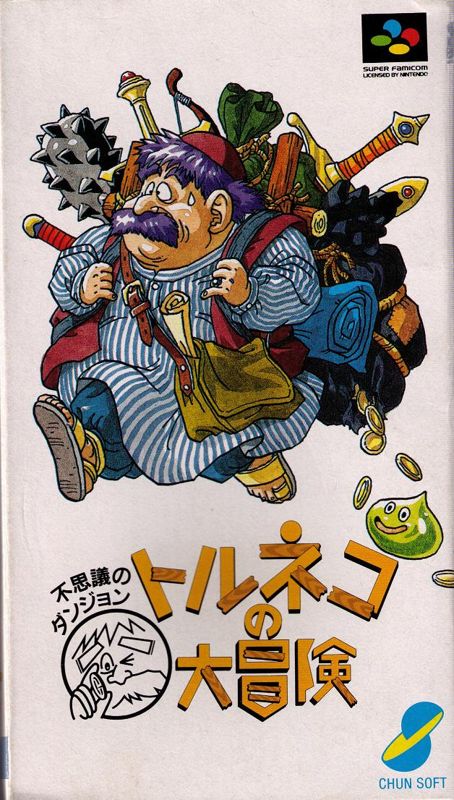
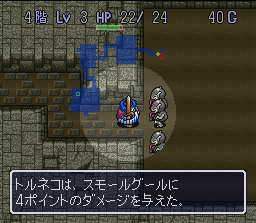

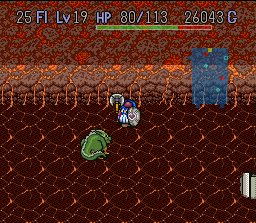
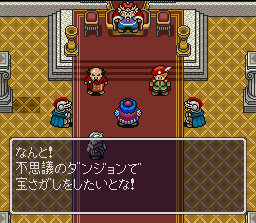
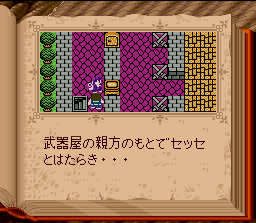


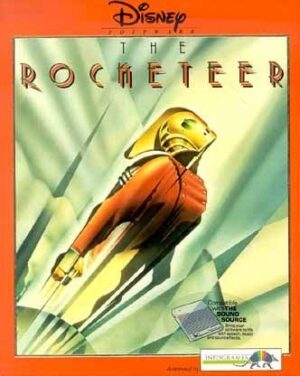
Reviews
There are no reviews yet.